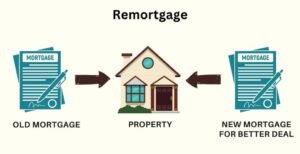
Thinking about remortgaging to secure a new fixed interest rate or tap into your equity to access additional funds for that dream home improvement project? While it can be a smart financial move, it’s important to factor in all the costs involved before you dive in. Remortgaging isn’t just about the new interest rate – there are various fees that can add up and impact the overall cost. Let’s break down the common remortgage fees and how they can affect your decision.
The Remortgage Fee Breakdown: Understanding the Numbers
-
Valuation Fee: Lenders need to determine the current value of your property before offering a remortgage. This valuation fee typically ranges from £150 to £300 (sometimes more), depending on the value and location of your property. Some lenders cover this, so you might not have to pay. But its important you know upfront in any case.
-
Mortgage Arrangement Fee: Also known as an application fee, this is essentially the lender’s administration charge for processing your remortgage application. This fee can vary significantly, ranging from a fixed amount (e.g., £1,000) to a percentage of the loan amount (e.g., 1-2%). Some lenders might even offer fee-free remortgages, but often with a slightly higher interest rate. It’s crucial to compare the overall package.
-
Booking Fee: This fee secures a specific interest rate for a limited period (usually a few weeks) while your remortgage application is processed. This fee is typically non-refundable if you decide not to proceed with the remortgage after the booking period ends. The amount can vary but usually falls within the £100-£200 range (though it could be more).
-
Legal Fees: You’ll need a solicitor to handle the legal aspects of remortgaging, including reviewing paperwork and transferring ownership from your existing lender. Legal fees can vary depending on the complexity of the case and the solicitor’s chargeable rate. Expect to pay somewhere between £500-£2,000 (though this could be more depending on the circumstances of your case).
-
Early Repayment Charge (ERC): If you’re remortgaging before the end of your current mortgage deal’s fixed-term period, you might be hit with an Early Repayment Charge (ERC). This fee can be a significant percentage of your remaining mortgage balance, potentially thousands of pounds. Always check your current mortgage agreement for any ERC details before considering a remortgage.
The Bottom Line: How Fees Affect Your Overall Cost
These fees can significantly impact the overall cost of remortgaging. Here’s how to consider them:
-
Compare Total Costs, Not Just Interest Rates: Don’t be fooled by a flashy low interest rate alone. Factor in all the remortgage fees associated with each offer to get a true picture of the overall cost.
-
Consider the Remortgage Term: The longer the remortgage term, the more time you have to spread out the fees, potentially making them more manageable. However, a longer term usually means paying more interest overall.
-
Free vs. Fee-Paying Mortgages: Carefully weigh the pros and cons. A fee-free remortgage might come with a slightly higher interest rate, but it can save you money upfront.
Ready to Remortgage with Your Eyes Wide Open?
Understanding the fees involved in remortgaging is crucial for making an informed decision. If you’re in need of a helping hand with this, we can:
- Compare remortgage deals and associated fees
- Calculate the overall cost of remortgaging
- Assess if remortgaging is the right option for your financial goals
Contact us today for a no-obligation consultation and navigate the world of remortgaging with confidence!






